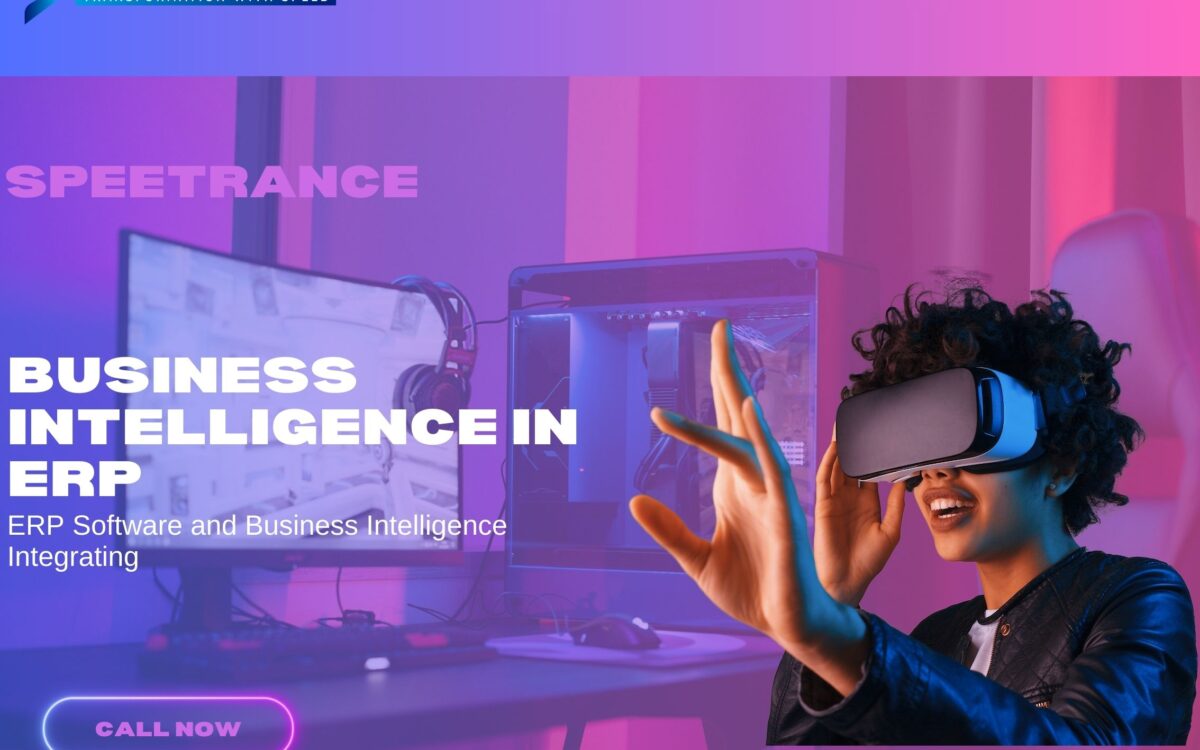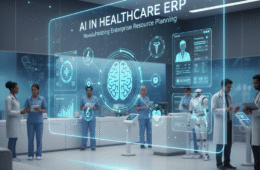
Business Intelligence in ERP: ERP Software and Business Intelligence Integrating
In today’s data-driven world, businesses are constantly seeking ways to extract meaningful insights from their vast amounts of information. Enterprise Resource Planning (ERP) systems, designed to centralize and streamline core business processes, generate a wealth of data across various departments. The true power of an ERP system, however, is amplified when it seamlessly integrates with Business Intelligence (BI) tools. This synergy transforms raw data into actionable intelligence, empowering organizations to make smarter decisions, optimize operations, and gain a significant competitive advantage. Understanding how ERP software and Business Intelligence integrate is no longer a luxury but a necessity for businesses aiming for sustainable growth and informed strategic planning.
At its core, an ERP system serves as the central nervous system of an organization. As ERP manages various business functions, including finance, human resources, supply chain, manufacturing, and sales, it accumulates a treasure trove of data reflecting the daily operations and performance of the entire enterprise. This data, however, often remains siloed within the transactional processes of the ERP. Business Intelligence acts as the key to unlock this potential, providing the tools and techniques to analyze, interpret, and visualize this data into meaningful insights.
The Evolution Towards Integrated Business Intelligence
Historically, BI tools often operated as separate entities, requiring complex and time-consuming data extraction, transformation, and loading (ETL) processes to pull information from the ERP system into a data warehouse or BI platform. This separation often led to data latency, inconsistencies, and a fragmented view of business performance. Modern ERP systems, however, are increasingly embedding sophisticated BI capabilities directly within their architecture. This integration offers numerous advantages, providing real-time insights directly within the context of operational workflows.
The journey of ERP software implementation is not merely about deploying a system to manage transactions; it’s about laying the foundation for data-driven decision-making. By integrating BI from the outset, organizations can ensure that the wealth of data generated is readily accessible and can be transformed into actionable knowledge.
The Symbiotic Relationship: How ERP and BI Work Together
The integration of ERP and BI creates a powerful symbiotic relationship. The ERP system provides the raw material – the transactional data – while the BI tools act as the analytical engine, transforming this raw data into meaningful information. This integration allows users to:
- Gain Real-time Visibility: Embedded BI provides up-to-the-minute insights into key performance indicators (KPIs) directly within the ERP interface. This allows managers to monitor performance, identify trends, and react quickly to emerging issues without having to switch between disparate systems.
- Conduct Deeper Analysis: Integrated BI tools offer advanced analytical capabilities, including data mining, predictive analytics, and forecasting. This enables users to go beyond simple reporting and identify the root causes of performance issues, predict future trends, and proactively plan for potential challenges and opportunities.
- Improve Decision-Making: By providing a holistic and accurate view of business performance, integrated BI empowers users at all levels to make more informed and data-driven decisions. Whether it’s optimizing pricing strategies, improving supply chain efficiency, or identifying new market opportunities, the insights derived from integrated BI can significantly impact business outcomes.
- Enhance Collaboration: Integrated BI platforms often include features for collaborative analysis and reporting, allowing different departments to share insights and work together towards common goals. This fosters a more data-centric culture across the organization.
- Personalize Insights: Modern ERP systems with embedded BI allow users to customize dashboards and reports to focus on the KPIs that are most relevant to their roles and responsibilities. This ensures that individuals have the information they need at their fingertips to effectively manage their areas of responsibility.
Real also : What is Tableau? Understanding Tableau Explorer, Creator, and Viewer Roles
Deep Dive into Technical Integration
The technical integration of ERP and BI involves several key aspects:
- Data Architecture: Modern ERP systems are designed with data accessibility in mind. Their underlying data models are structured to facilitate efficient querying and analysis by embedded BI tools. This often involves optimized data structures and in-memory computing capabilities, as seen in SAP S/4hana, which significantly accelerate data processing and analytical performance.
- APIs and Connectors: ERP systems expose Application Programming Interfaces (APIs) and provide pre-built connectors that allow BI tools to seamlessly access and extract data. This eliminates the need for complex custom integrations and ensures data integrity.
- Embedded Analytics: Many ERP vendors are now embedding BI functionalities directly within their applications. This can range from basic reporting tools to sophisticated analytical dashboards and self-service BI capabilities. For instance, the SAP ERP business intelligence module, while evolving with newer SAP offerings, provided foundational analytical capabilities directly within the traditional SAP ERP environment.
- In-Memory Computing: Platforms like SAP HANA, the underlying database for SAP S/4HANA, leverage in-memory computing to process massive datasets in real-time. This dramatically accelerates BI queries and enables advanced analytical techniques that were previously computationally infeasible.
- Data Warehousing and Data Lakes: While embedded BI is becoming increasingly powerful, organizations with complex analytical requirements may still leverage separate data warehouses or data lakes. In such cases, the ERP system needs robust integration capabilities to efficiently extract and load data into these external platforms.
The Landscape of ERP and Integrated BI Solutions
The market offers a variety of ERP software solutions with varying levels of integrated BI capabilities.
- SAP S/4HANA: As mentioned earlier, SAP S/4HANA boasts a tightly integrated BI architecture leveraging the power of SAP HANA. Its embedded analytics capabilities provide real-time insights across all business functions.
- SAP Business One: Designed for small and medium-sized enterprises, sap business one also offers integrated reporting and analytical tools to help businesses gain visibility into their operations. While its BI capabilities might be less extensive than S/4HANA, it provides a solid foundation for data-driven decision-making within the SME segment.
- Other Major ERP Vendors: Other leading ERP vendors like Oracle NetSuite, Microsoft Dynamics 365, and Infor also offer embedded BI functionalities within their respective suites. The level of integration and the sophistication of the BI tools vary depending on the vendor and the specific product.
For businesses considering ERP software implementation, evaluating the embedded BI capabilities should be a key factor in the selection process. Understanding how seamlessly the ERP system integrates with analytical tools and the depth of the provided BI functionalities can significantly impact the long-term value derived from the investment.
The Importance of Local Expertise: ERP Implementation in Delhi NCR and Noida
For businesses operating in specific geographic regions, such as those seeking erp in delhi ncr or erp in noida, partnering with a local ERP implementation specialist can offer significant advantages. These local providers often have a deeper understanding of the regional business landscape, regulatory requirements, and specific industry challenges. They can provide tailored ERP software solutions and ensure a smoother ERP software implementation process. While the core ERP system and its integrated BI capabilities remain consistent, a local partner can provide valuable customization and support that aligns with the unique needs of businesses in the region.
Looking Ahead: The Future of Integrated BI in ERP
The integration of Business Intelligence within ERP systems is a continuously evolving field. Future trends point towards even tighter integration, with advancements in areas such as:
- Artificial Intelligence (AI) and Machine Learning (ML): Embedding AI and ML capabilities directly within the ERP BI framework will enable more sophisticated predictive analytics, anomaly detection, and automated insights generation.
- Natural Language Processing (NLP): NLP will allow users to interact with their ERP data using natural language queries, making BI more accessible to non-technical users.
- Real-time Prescriptive Analytics: Future ERP systems will not only provide insights into what happened and why but also recommend specific actions to optimize performance in real-time.
- Edge Computing and IoT Integration: As businesses increasingly adopt IoT devices, ERP systems with integrated BI will be able to analyze data from the edge in real-time, providing immediate operational insights.
Conclusion: Illuminating the Path to Business Success
The integration of Business Intelligence within ERP systems represents a paradigm shift in how organizations leverage their data. By transforming ERP systems from mere transactional engines into powerful analytical platforms, businesses can unlock a wealth of insights that drive better decision-making, optimize operations, and foster innovation. As ERP manages various business functions, the ability to analyze the data generated within these functions in real-time and within the same platform provides an unparalleled advantage. Whether a business is considering its first ERP software implementation or looking to enhance its existing analytical capabilities, understanding the power of integrated BI is crucial for navigating the complexities of the modern business environment and illuminating the path towards sustained success. The seamless fusion of operational data and analytical power, exemplified by modern platforms like SAP S/4HANA and tailored to regional needs by experts providing erp in delhi ncr and erp in noida services, is the key to unlocking true business intelligence and achieving a competitive edge in the digital age.





